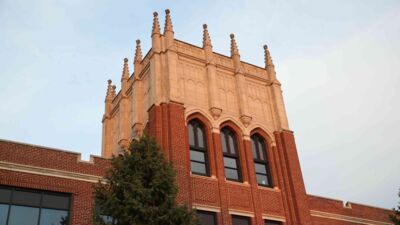What You Can Do with a Church Music Degree

The Lutheran church musician is the basis of and go-to person for all music-related activities that take place within a congregation, and sometimes at an associated school or preschool. These extraordinary servants of the Lord have received a thorough education in the musical arts and skills in coordinating musical groups in the parish setting. Therefore, Lutheran church musicians have a unique calling that allows them to serve the Lord with their musical and relational talents. At Concordia University, Nebraska, the Bachelor of Music degree in church music will prepare you for one of many career options and lifelong service to the church and the world.
Concordia is undoubtedly a school that has a strong church music program. Many students are involved in endeavors related to parish music, even those who are not declared majors in the area. Within the B.Mus. program, however, you will take courses in hymnody, liturgy, aural skills and music theory, arranging, conducting, and even music education! Many church music students choose to declare a second major in music education, in fact, so that they are qualified to teach in a school setting.
What makes Concordia’s church music program unique is that it enables its graduates to gain placement on the LCMS’s roster of directors of parish music (DPMs). The only requirement for church music graduates to be placed on this list is that they take three extra courses in Biblical interpretation and Lutheran doctrine during their time at Concordia. A career as a director of parish music is one of the primary opportunities for church music graduates.
As a Lutheran director of parish music, you will be responsible for leading most music-related worship initiatives within your congregation, such as directing adult and children’s choirs, serving as the congregation’s primary accompanist (on organ, piano, or another instrument), leading handbell choirs, scheduling rehearsals and performances, and more. With all these different duties, it is no surprise that church music majors are often busy with performances, compositions, and practice sessions! However, despite the commitment that comes with being a church music major, it is a highly rewarding undergraduate program choice.
Although most churches do not require their parish music directors to possess a graduate degree, attending graduate school is another option for church music majors after they complete their bachelor’s degree. Earning a graduate degree allows students to concentrate on a specialty, develop new skills, or earn different qualifications. Graduate degrees in church music can range from a master’s degree in general church music to a Doctor of Musical Arts in organ performance. Depending on students’ career goals and aspirations, they may or may not choose to pursue graduate-level studies. These programs allow students to gain specialized skills in the areas they’re most interested in.
Church musicians are extremely versatile and can end up working in churches that are large or small, contemporary or traditional, in large cities or tiny towns, and with a wide range of diverse congregations. No matter where a church music student finds his or her calling, their skills and work will be indispensable in carrying the congregation they serve into the next chapter of its ministry.
Interested in Concordia’s church music program? Learn more here.
Related Stories


